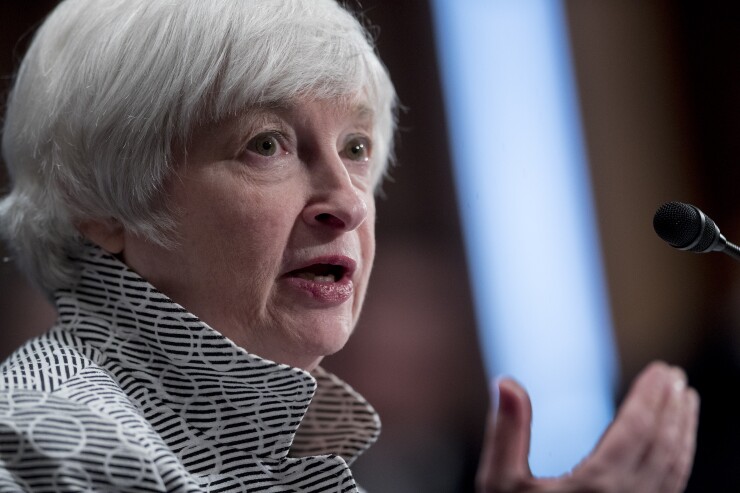
WASHINGTON — Treasury Secretary Janet Yellen said that a combination of higher vacancy and interest rates in commercial real estate will hit the banking sector, but that she doesn't expect it to be a systemic risk.
Yellen's comments come amid a turbulent week for New York Community Bancorp as its
That's combined with substantially higher interest rates and falling valuations, she said.
"So it's obvious that there's going to be stress and losses that are associated with this," she said. "The banking supervisors are working with their banks to manage this risk and identify it. I believe this will not end up — I hope — being a systemic risk to the banking system."
Yellen said that the largest banks' exposure is quite low, but "there may be smaller banks that are stressed by these developments."
The Financial Stability Oversight Council, which Yellen as Treasury Secretary chairs, is working with bank supervisors to understand exposures, she said.
"There are some institutions that will face stresses from commercial real estate that we know was significantly impacted, particularly office buildings by the pandemic," Yellen said. "Interest rates are higher, loans will need to be refinanced in an environment with higher interest charges, lower valuations and rising vacancy rates, so for some banks this will be a concern. But on balance, I think the system is well capitalized."
Only Sen. Elizabeth Warren, D-Mass., brought up the trouble with New York Community, which she did as part of a larger point on bank capital. Warren said that banking groups, which have pushed back intensely against the Basel III endgame rulemaking, are claiming that higher capital costs will result in higher prices for consumers.
"Less than a year after three billionaire banks collapsed, another one, New York Community Bank, is now teetering," Warren said. "So we're just trying to make sure that these giant banks don't go broke and come back to the American taxpayer like they have done before to get a bailout."
Warren said banking trade associations' claims that the proposed capital rule changes will hurt bank customers are misleading. She said, instead, that the Basel III endgame rulemaking, which would raise capital standards for the largest banks, would cut into banks' buybacks and executive compensation.
"They spent millions of dollars lobbying, they're even running ads during the NFL playoffs, claiming that if they have to be a little bit safer, it will somehow raise grocery prices for American families. In other words, they want us to believe that big banks are really worried about Americans' grocery bills. Nobody believes that."
Yellen, in response to Warren's questions, outlined clearly her support for higher capital standards, although Warren didn't directly ask Yellen whether she supports the actual Basel III endgame proposal put out by the bank regulators. Yellen said that the proposal would have no impact on smaller community banks.
Earlier this week,
"Even in normal times, capital is something a bank has to have in order to lend, so it's critical to meeting the borrowing needs of households and businesses throughout the economy," she said. "When shock hits like we saw in the financial crisis, a bank can fail if it runs through its capital, and if it's a large bank or one that is highly interconnected to other financial institutions, its failure can have devastating consequences to the financial system as a whole."
Kevin Fromer, the president and CEO of the Financial Services Forum, which represents the largest U.S. banks, immediately pushed back on Warren's characterization of the capital rules and the rhetoric around them.
"Proposals to substantially raise capital requirements for the largest U.S. banks are solutions looking for a problem," he said in a statement to American Banker. "That's why it's not surprising to see people using any banking issue — no matter how irrelevant — as an opportunity to try to make the case to increase capital. Using unrelated issues involving a handful of regional banks to justify increased large bank capital requirements is misguided and wrong. As so many organizations, such as the NAACP, the National Association of Manufacturers, and CalPERS have warned, higher capital requirements would act as a drag on the economy, particularly for small businesses and those in low- and moderate-income communities."





